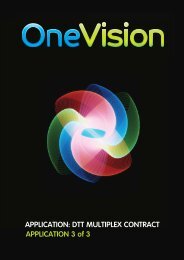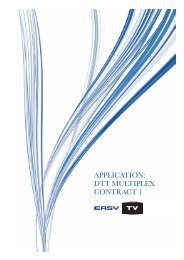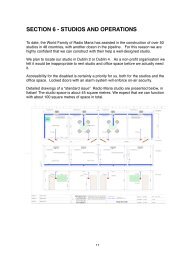Digital Radio for Ireland: Competing Options, Public Expectations - BCI
Digital Radio for Ireland: Competing Options, Public Expectations - BCI
Digital Radio for Ireland: Competing Options, Public Expectations - BCI
Create successful ePaper yourself
Turn your PDF publications into a flip-book with our unique Google optimized e-Paper software.
Not all respondents agreed with the emphasis placed on incentives to attract commercial radio. Kevin <br />
Griffiths, Claremorris Community <strong>Radio</strong> among others, argued that investment in digital would <br />
ultimately be a commercial decision which if it was to their commercial advantage, companies should <br />
pay <strong>for</strong>. What is required, though, is ‘some element of Government support that protects interests of <br />
non‐profit broadcasters’. <br />
The question of incentives to encourage industry‐wide participation in a new digital roll‐out is, <br />
however, only part of the equation. The UK experience of incentives such as automatic licence <br />
renewals was in that in many cases it did not lead to any new content. The need to create a culture of <br />
innovation, there<strong>for</strong>e, within the proposed digital radio policy was raised by a number of respondents <br />
including ComReg, the <strong>BCI</strong>, the Department of Communications, RTÉ and Dusty Rhodes, Managing <br />
Director of <strong>Digital</strong> Audio Productions. For Dusty Rhodes, lessons needed to be learned from previous <br />
strategies that had attempted to transition a whole sector by migrating existing services to new <br />
plat<strong>for</strong>ms: ‘There's no point in saying if you simulcast on DAB, we'll extend your licence ‐ because <br />
there is no point in only simulcasting on DAB. It should be if you simulcast on DAB and do X, Y and Z to <br />
actually improve the service to the listener, then we'll extend your licence. Simulcasting alone...What's <br />
the point?’ <br />
This point was echoed by John Doherty of ComReg who argued that additionality, bringing something <br />
new, would be central to developing the business case <strong>for</strong> digital radio: ‘I think that the UK experience <br />
would seem to demonstrate that it's a quite difficult business case, even <strong>for</strong> the incumbent operator… <br />
[it’s] difficult <strong>for</strong> commercial operators to build a strong business case around… you have to future‐<br />
proof it, look at new technology, look at content and look at what actually would underpin a business <br />
case to actually make it a successful product launch out there’. <br />
Similarly, Quentin Howard referred to the UK experience, in that while the they had incentivized the <br />
major brands to move into DAB, it had not linked that transition to the need to innovate, to change <br />
radio. Phil Laven put it: ‘radio needs to be doing something different…if broadcasters don’t react by <br />
offering new content tailored to their particular audiences people will start to go off air because they <br />
can’. <br />
JP Coakley of RTÉ argued that ‘the key to regulation of DAB is some sort of balance between the <br />
protection of the existing market versus competition and innovation‐ new competition, new services, <br />
new innovation. And that I think explains the fear or incapacity, or unwillingness of regulators to <br />
engage with this. Because it essentially means inventing a new market… while protecting the existing. <br />
So that is difficult’. For him, Australia was proving a digital radio role model. ‘I think what’s new about <br />
Australia is the mandating of innovation. The mandating of new content. You get your licence, you get <br />
your transmission, but you’re also compelled to bring something new to the table’. 26 <br />
Several of our interviewees spoke of the need <strong>for</strong> digital to deliver something ‘better’ than FM and <br />
concern was expressed about the UK model where multiplexes had been pushed to carry more <br />
services at lower sound quality. For John Doherty at ComReg this was one of the lessons <strong>Ireland</strong> <br />
needed to learn from the UK. It has to mean more than spectrum efficiency, it has to make a <br />
difference to the end‐users. ‘What is the difference, if you like, that they can look from this technology <br />
over an existing radio set that has….been around now <strong>for</strong> nearly a hundred years. If they’re going to <br />
<br />
26 Australian Government. ‘Broadcasting Legislation Amendment (<strong>Digital</strong> <strong>Radio</strong>) Act 2007’, Department of <br />
Broadband, Communications and <strong>Digital</strong> Economy, Australia, May 2007. <br />
47






